TL;DR: Retail contracts are legally binding documents that define the retailer-supplier relationship and protect businesses during a crisis. This guide covers different types of retail contracts, key elements of a retail contract, how to draft a retail contract, and the best practices one must follow, including automating workflows through CLMs like SpotDraft.
In 2020, when the pandemic hit, electronics retailers faced significant challenges due to the surge in demand for gaming consoles. Retailers with well-structured contracts in place with their suppliers were able to secure favorable inventory allocations and protect themselves from price gouging.
On the other hand, those who didn’t have formal retail contracts found themselves in a challenging situation with dwindling stock and rising prices. That’s why a solid retail contract is a must for every retailer. It safeguards businesses during such unpredictable times.
A retail contract legally defines the relationship between a retailer and a supplier or manufacturer, specifying every minute detail, such as pricing terms, quality standards, and delivery schedules.
By the end of this blog post, you'll know everything you need to know about retail contracts, the different elements of a retail contract, and key clauses to include with a sample retail contract template to help you get started.
What are retail contracts?
Retail contracts are legally binding documents that outline the relationship between a retail business and other parties in the retail ecosystem. They include different terms and conditions and ensure that each party understands its rights and duties, along with other crucial details. A retail contract guides both the retailer and the vendor to function smoothly and safeguards the interests of the businesses involved during any potential dispute. If you’re still thinking about whether you need a retail contract, know why it’s so important for your business.
Importance of retail contract
Retail contracts play a crucial role in a retail ecosystem. Here’s why the retail contract is essential:
- Legal protection: A retail contract offers legal protection for all the parties involved, thus mitigating the risk of vulnerabilities in disputes and providing direction during breaches or crises.
- Risk management: Retail contracts allocate risks appropriately through indemnification clauses, insurance requirements, and limitations of liability provisions.
- Operational clarity: A well-drafted retail contract brings in operational clarity. For example, it takes into account the acceptable quality of a product, delivery schedules, performance standards, etc, thus eliminating the scope of any ambiguity.
- Business continuity: Retail contracts ensure a consistent supply of products, particularly through clauses addressing disruptions and force majeure events.
- Protect interests: By clearly mentioning the business terms, a retail contract can safeguard your business from any potential disputes.
- Adhere to legal compliance: By adhering to retail contracts, businesses can stay legally compliant, which means you are abiding to the local law and industry regulations.
- Vendor relationship management: A retail contract formalizes the relationship between businesses, establishing communication protocols and guidelines for addressing concerns.
Now let’s understand what some of the key elements of a retail contract are.
Elements of a retail contract
While a retail contract varies depending on the product, market, or the arrangements between the parties involved, the key elements of a retail contract include:
- Parties involved: This section outlines the legal name of the retailer and the supplier or manufacturer.
- Obligations and responsibilities: This section clearly mentions who is responsible for what. This can include marketing efforts, return policy, inventory, etc.
- Terms and conditions: This critical section outlines all the details related to the vendor contract, like the duration of the contract, the nature of the relationship etc.
- Territory: This section outlines the geographic territory in which each party is free to operate. Any exceptions must be mentioned clearly in the contract.
- Pricing: What price does each party need to pay? What are the discount terms? The pricing section of the contract mentions all these details.
- Distribution: How does the product get distributed from one party to another? This section of the contract outlines the distribution of the product.
- Marketing support: Both parties must agree on how much marketing support is needed from one party to the other.
Now that you’re familiar with the key elements of a retail contract, let’s see what are some of the must-have clauses of a retail contract.
Key clauses of a retail contract
When you draft a retail contract, you need to remember your business goals. Apart from helping you streamline your retail business, the retail contract should also mitigate risk and add a layer of protection to your business.
Adding specific clauses is thus essential to safeguard your business during a crisis. Here are some key aspects to include in a retail contract.
- Indemnification clause : This clause helps you protect your financial assets in case of a loss or damage. Adding this clause means you’re taking into account the risk factors and ensuring you stay protected from financial loss or damages while being able to hold the other party accountable if something goes wrong.
“If someone said you can only work on one section of a contract, I would always pick the section dealing with indemnification, limitation of liability and warranty. Or, as I call them, the “Big Three.”
~Sterling Miller, CEO and Senior Counsel for Hilgers Graben PLLC
Ten things I know its only boilerplate but i like it
- Dispute resolution clause: Disputes may arise in any business at any time between the parties involved. This clause defines how the parties will resolve any disputes that may occur during the contract term. This clause gives you more control in efficiently managing and mitigating disputes.
“While it is always very exciting to enter into a new agreement with another party, I always remember that you need to plan for the divorce. The time to do that is at the beginning of the relationship. Dispute resolution clauses can be short or an entire exhibit to the contract. I like to make them as detailed as possible because I have seen the fallout of poorly drafted dispute resolution clauses.”
~Sterling Miller, CEO and Senior Counsel for Hilgers Graben PLLC
Ten things I know its only boilerplate but i like it
- Termination clause: A termination clause in a retail contract mentions different conditions under which a retail agreement can be terminated by either party. This is important because it provides clear guidelines on how either party can end a contract without violating the written agreement.
“Surprisingly, one of the most litigated parts of any contract are the term and termination provisions. In the agreement it can be on a fixed date (it simply expires), so many days after notice is given (often called “termination for convenience”), upon a triggering event of some nature, or upon an uncured breach (material or otherwise) or a failure to make payment (and there are also ways to terminate a contract that arise under the Common Law. A question to ask yourself when negotiating a contract is whether you can terminate one part of the contract (e.g., a Statement of Work), and keep the main contract in place (a Master Services Agreement)? Like the start date of the contract, being crystal clear on when the contract ends can save you a lot of heartaches. Spend the necessary amount of time thinking about all of the reasons you’d want to the agreement to terminate and make sure those are included.”
~Sterling Miller, CEO and Senior Counsel for Hilgers Graben PLLC
Ten things I know its only boilerplate but i like it
- Force Majeure clause: There are certain situations like a pandemic, earthquake, wildfire, or a tsunami that are beyond the control of either party. In such unforceable disruptions, this clause safeguards a business that you’re not in breach of a contract. In case this clause is not mentioned, you may have to turn to common law, which may or may not remove the liability.
“Force majeure is a provision that covers situations that will excuse performance by one of the parties. Since the term has no separate legal definition that you can fall back on, it is important to draft carefully. If the clause is drafted broadly, e.g., “circumstances beyond the reasonable control of the affected party” it can be a path for one party to get out of the contract simply by claiming something is beyond their reasonable control. The other way to go is to list specific events that constitute an excuse of performance. If drafted too narrowly, however, you can find yourself in a spot where something truly unforeseen happens and it’s not listed. Most clauses cover, at a minimum, “acts of God” such as a hurricane, fire, flood, earthquakes, etc. Some include situations specific to the business, e.g., internet outage. Typically, payment obligations and confidentiality obligations are not excused during a force majeure event. And most clauses include time limits whereby if the force majeure event continues past a certain time frame (e.g., more than 30 days), the contract will – or can be – terminated with both parties excused from further performance.”
~Sterling Miller, CEO and Senior Counsel for Hilgers Graben PLLC
Ten things I know its only boilerplate but i like it
- Confidentiality clause : Every contract contains confidential information that, if divulged, can harm the business. This clause helps protect sensitive information from being exposed to the public. A confidentiality clause, also known as a non-disclosure clause, helps protect crucial information like sales strategy, financial information, trade secrets, or clients’ information.
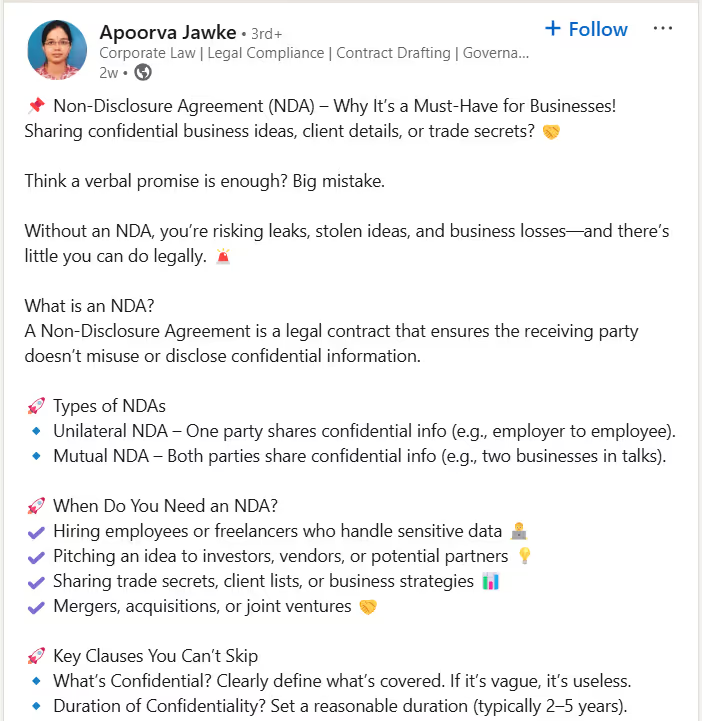
What are the different retail contracts that you need to know? Which are relevant to your business? Let’s find out.
Common retail contracts in the retail industry
Retail contracts can be of different types. Here are some of the most common ones:
Retail vendor agreement
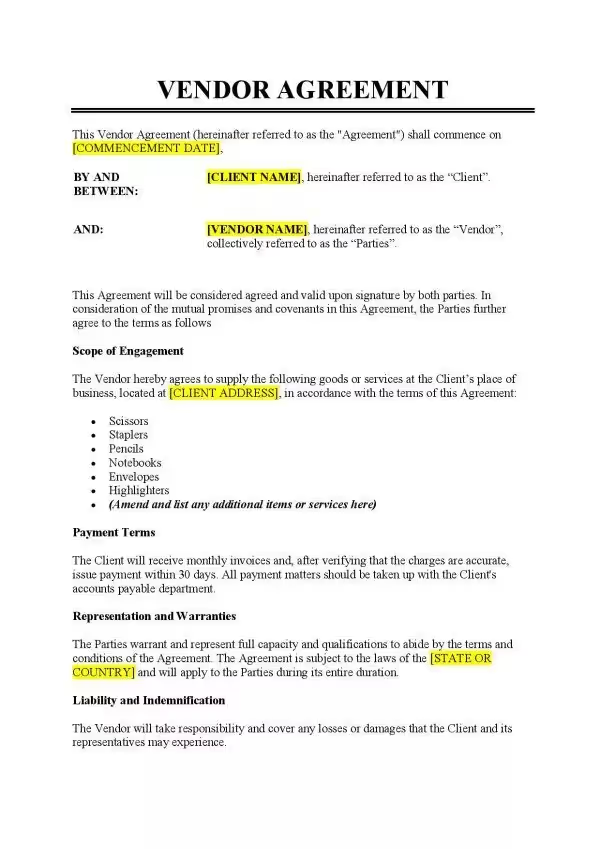
Source: https://easylegaldocs.com/templates/agreements/vendor-agreement/
This type of retail agreement outlines the working relationship between a retailer and a vendor. There can be different types of retail vendor agreements depending on the nature of work/services involved. A retail vendor agreement usually includes:
- Payment terms
- The total contract amount
- How to resolve disputes
- Conditions around returning goods, either faulty or not
- Contract turnaround time
When to use it: This type of contract comes in handy when selling goods in a retail store or online, establishing rights between retailers and the other party, and clarifying payment terms.
Non-disclosure/ Confidentiality agreement
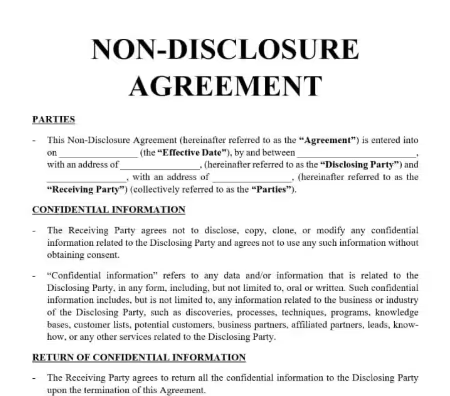
Source: https://signaturely.com/contracts/non-disclosure-agreement-template/
Non disclosure agreements or confidentiality retail contracts ensure that none of your crucial business information gets leaked to the public, especially to your competitors, vendors, and suppliers. Also known as NDAs, this type of contract is especially useful for protecting intellectual property rights and patents.
If it’s a unilateral NDA, one of the parties agrees not to disclose information, whereas in a mutual confidentiality agreement, both parties agree not to disclose information.
When to use it: This retail agreement is a must when you’re sharing sensitive business information with suppliers or manufacturers.
Also read: The Ultimate NDA Checklist: Draft, Review & Sign NDAs with Confidence
Lease agreement

Source: https://metrobi.com/blog/common-retail-contracts-and-when-to-use-them/
This retail agreement outlines the detailed terms and conditions for renting a property. This can include details like the lease duration, rent payment terms and conditions, insurance and tax, and usage conditions.
When to use: This agreement is used when renting a space for a store or a distribution center to clarify maintenance and lease renewal options and formalize the relationship between the property owner and the retailer.
Bill of sale
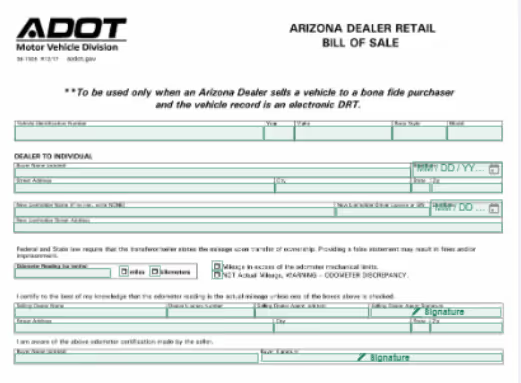
Source: https://bluenotary.us/templates/retail-bill-of-sale-template/
This contract records the transfer of ownership. In retail, this means that when you sell a product to a customer, a bill of sale will include all the product details and pricing details.
When to use it: A bill of sale is usually used during the exchange or transfer of goods.
Now that you understand the different types of contracts and when to use them, let’s see how to draft a legally binding retail contract.
How to draft a retail contract ( +free template)
Drafting a contract is complex and can be overwhelming at times. But here's a checklist of some of the non-negotiables that every retail contract must have.
Identify all the parties involved
When drafting a retail agreement, clearly mention who is involved in the contract. Don't just leave with mere details like company name and address. This specifies who has the decision-making authority to approve changes or sign off on deliverables.
This section should include:
- Recitals that mention the background information about the purpose of the retail agreement. This is important for both parties to understand the goal of this relationship.
- Additional members/partners or third parties who need to be involved in the agreement may be parties to the agreement.
- For example, it can be a signing authority on behalf of the retailer or a partner of the manufacturer’s company, etc.
Outline key contract terms and conditions
This section is the most critical part of the retail agreement that specifies what each party is allowed to do or cannot do. This includes confidentiality requirements, exclusivity agreements, usage rights, and so on.
Key terms and conditions must include:
- Exclusivity specifies if the agreement is exclusive, so the supplier can't sell it outside the territory mentioned
- Duration: Define the start and end date of the contract
- Territory: Establish the geographical territory where both parties can operate
Obligations and responsibilities
Mention clearly the obligations and responsibilities of all the parties. This can cover various aspects like:
- Responsibility of marketing and sales
- Addressing quality assurance and any product quality requirements
- Define the terms for product supply, minimum order value, inventory management, etc
- Any training or support resources that the supplier will provide to the retailer.
Mention deliverables
Next, in the contract, mention what you will be providing exactly and what the acceptance criteria are. For example, for a manufacturer, it can be the number of parts it agrees to deliver and the timeline for it.
Also, add clauses for delays or unforeseen incidents ( like a pandemic or an earthquake).
Settle payment terms
Delays or not receiving deliverables even after payments can cause significant roadblocks in any retail business. Establishing clear payment terms can help you build a safetynet against delays. Include accepted payment methods, penalties for delays, and detailed payment terms in your contract.
Don't forget dispute resolution and termination
No business is immune to costly disputes, and that’s why a clear clause to resolve disputes must be mentioned in the contracts. In this section, also mention which state’s applicable law governs the contract and if you’ll be using traditional court proceedings if the need arises.
Adding a termination clause ensures that either party has a clear exit procedure if the partnership doesn't work. This may include a standard 30-day notice period, contract timelines, and immediate termination rights for breach or any deal-breaking.
Include the ‘standard’ clauses
These ‘standard’ clauses are a must-have in every contract as they work as a safety net for your retail business. Some of the standard clauses that you must include are:
- Force Majeure clause
- Confidentiality clause
- Indemnification clause
Signatures
A contract is invalid without the signatures of both parties. So, remember to get the agreement signed to make it legally binding. Always have your lawyer verify any legal documents before you sign them.
Also read: A Quick Introduction to eSignatures
RETAIL AGREEMENT Template
Prepared for: Prepared by:
Retailer Agreement
The Retailer Agreement (this "Agreement") is made effective as of ________________, between [seller name] of [seller address] [“seller”] and [retailer name] of [retailer address] [“retailer”].
ITEMS PURCHASED. Seller agrees to offer to Retailer for sale the following products (the "Goods") in accordance with the terms and conditions of this non-exclusive Agreement:
<Add product standards>
<Add pricing and order details here>
<Add sale of product details here>
<Add retail store facility/distribution details here>
<Add Payment terms for Goods here>
<Add delivery details here>
<Add Warranty details here>
IN WITNESS WHEREOF, this Agreement has been executed by each of the individual parties hereto on the date first above written.
Retailer Seller
________________________ ________________________
Signature Signature
________________________ ________________________
Name Name
________________________ ________________________
Date Date
Note: This is a template and should be reviewed by your lawyer before implementation.
Source: https://www.fillhq.com/ifream-show-template/retail-agreement/?tmpname=Retail%20Agreement
So, as a retailer, what are the best practices that you must adhere to? Let’s check them out.
Best practices of retail contracts
Executing retail contracts is crucial for a retail business to maintain strong relationships with its suppliers and manufacturers and ensure smooth transactions. Here are some industry best practices that will help you navigate this process easily.
- Standardize your terms and conditions
Before you draft your first retail contract, ensure that you standardize your terms and conditions clause. This should include all the standard elements like warranty, termination, resolving disputes, force majeure, liabilities, etc. This will help you maintain consistency across all your retail contracts.
For example, if your termination of contract allows you to include a 30-day provision, ensure it’s included in every retail contract.
- Use a predefined clause library for a fallback option
It’s natural for a retail business to come across terms that don't align with your company’s standards. What do you do in such situations?
For example, if a vendor requests to change your indemnity clause, will you accept it or reject it?
The predefined clause library comes in handy in such situations. A clause library integrated with your contract lifecycle management system can let you quickly adapt to the scenario. It enables you to add pre-approved fallback positions while still staying compliant.
The clause library in SpotDraft is a powerful tool that empowers you to streamline your retail contract process with its central repository of commonly used clauses and fallback options.
Also read: Using Clause Library in SpotDraft
- Sign contract terms electronically
Electronic signatures can speed up any retail contract signing process. They’re legally binding and convenient, allowing the concerned parties to sign from anywhere at any time.
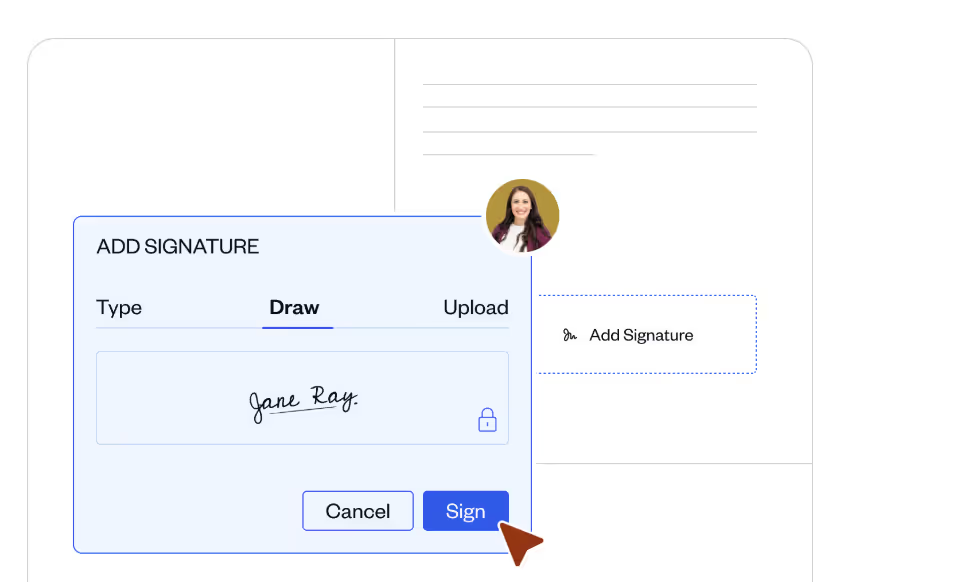
For example, with SpotDraft CLM, you can get legally binding consent while eliminating the need for paper signatures. What’s more, you can save all signed contracts in your SpotDraft repository.
- Set up reminders for contract renewal
Use your CLM, like SpotDraft, to track contact renewal or expiration dates. Set up reminders to ensure you won't miss important deadlines. As a best practice, set up a reminder for 60 days to review any changes needed in the contract for a seamless operation.
Also read: Contract renewal process: Strategy+best practices
- Automate workflows
Routine retail contract management is easy when you’re a small company. But as you start growing and expand in volume, retail contract management can become a daunting task. Automating your contract workflow can help you save time while managing operations efficiently.
With a solution like SpotDraft, you can standardize your terms, use pre-approved clauses, keep track of all the important dates, and send automated reminders when a renewal date approaches.
Managing retail contracts
Retail contract management allows you to oversee and analyze the agreements a retail business has with its suppliers, vendors, and manufacturers. It helps every retail contract stay on track and within the permissible budget while reducing risk and enhancing performance.
It includes:
- Storing and organizing your contracts
- Negotiating contract terms
- Ensuring all compliance guidelines are met
- Keeping a tab on contract progress and data
Also read: Contract Lifecycle Management Process: All You Need to Know
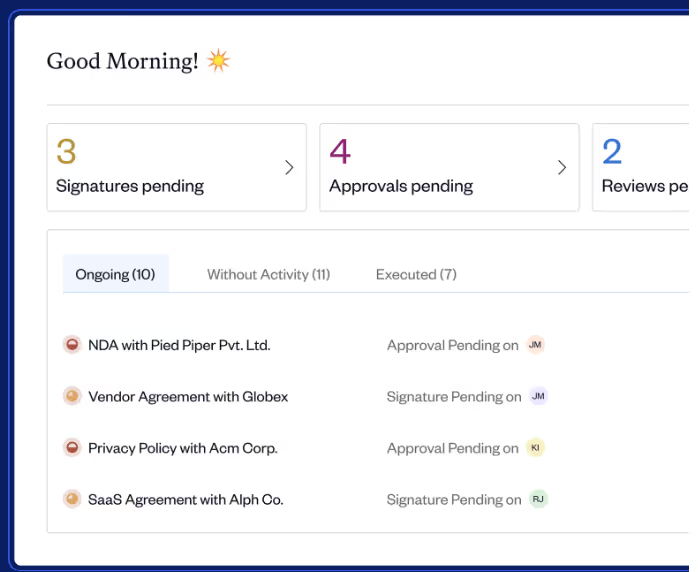
Source: https://www.spotdraft.com/
How does SpotDraft help in managing retail contracts efficiently?
SpotDraft is the best-in-class retail contract management software, revolutionizing the way organizations manage retail contracts and monitor contract performance.
With its advanced features and intuitive interface, SpotDraft streamlines the retail contract management process and provides valuable tools to enhance retail contract performance.
If you want a trusted CLM to manage your retail contracts efficiently, check out SpotDraft. Request a demo.


.avif)



.avif)


